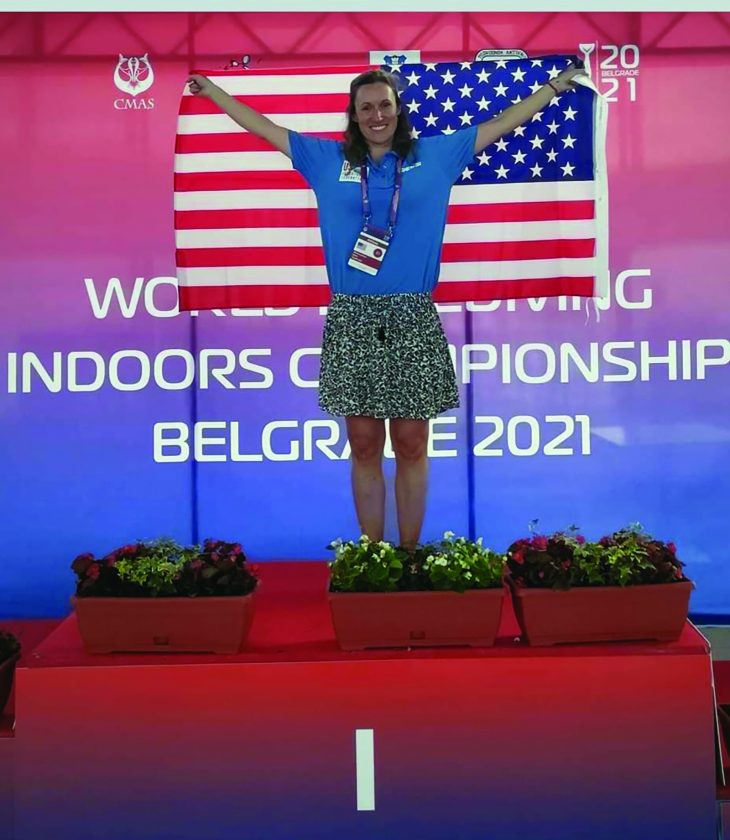Kleinwachter collects record as 1st American participating at IFWC

Courtesy photo Kaite Kleinwachter poses with the American flag at the World Indoor Championships for freediving in Belgrade, Serbia recently.
Growing up, Katie Kleinwachter spent many of her summer days in and along the waters of Lake Michigan around Escanaba. Now, she still spends her time in and around the water but as a representative of the United States.
Kleinwachter — who relocated to Spain in 2010 — recently competed in the Indoor Freediving World Championships in Belgrade, Serbia, June 21-27. She was the sole U.S. diver to compete at the event that hosted 130 athletes from 26 different countries.
She left the event with a new American record for static apnea, holding her breath for five minutes and 41 seconds underwater.
“It’s an absolute dream to represent the United States on the world stage and be the first American diver to ever participate in an Indoor World Championship,” said Kleinwachter. “I think many little kids dream of going to the Olympics to represent their country, and a World Championship is the equivalent for my sport.”
Kleinwachter added the event organizers shared her enthusiasm for competing at the World Championships.
“The organizers and teams from around the world were overjoyed to have an American participating,” she said. “Many teams wanted to take a picture with their flag and the U.S. flag at the opening ceremony. It was surreal to hear them announce my name, saying ‘Katie Kleinwachter representing the United States of America’ and see (myself) on the Jumbotron.
“As you can imagine, arriving at this elite level of competition, my emotions were all over the place. The mind games are a big aspect of this sport, and I had quite a rough dive. But I still managed to break an American record for static freediving, holding my breath for 5 minutes 41 seconds.”
The sport of freediving can be traced back to ancient Greece, though the modern iteration of the sport arose in the 1970s.
Kleinwachter was introduced to the sport after her move across the Atlantic Ocean. The sport is a common one along the Spanish Coast. It was there she was taken in and began training with some of the best freedivers in the world.
Freediving, said Kleinwacther, is a sport all about mentally preparing yourself.
“You have to have your mind ready,” she said. “You can keep your body loose through specific stretching, and you wear a wetsuit to keep warm. Just before the dive, you go through a very specific warm-up of breathing exercises as you are preparing yourself for that last deep inhale. But you have to have your mind in the right place in a state of calm and serenity … which you can find by running your mind to different familiar places.”
Among those familiar places, Kleinwachter has thought of during different dives is Escanaba, which she envisioned during a dive at the Spanish Nationals April 24. Her time of five minutes 23 seconds there qualified her for the World Championship.
“In the first minutes of my dive, my mind went to Escanaba. I suppose it was a sort of sensorial meditation. (I was underwater with my eyes closed), but I could hear the waves lapping on the shore,” Kleinwachter commented. “I imagined that the cool water I felt on my face was that coca-cola-colored lake. I could feel that coarse Great Lakes sand with those ouchy bits of driftwood that stab you in the feet. … I had images of running through Ludington park with my brothers as adults and laughing to be the first one to get to the teeter-totters. I was underwater, but I could smell the pines and breathe the dew of those special UP mornings.”
While the descriptions presented by Kleinwacther paint a peaceful sport, in reality, freediving can be very dangerous. This was a point she made sure to emphasize.
“Freediving or holding your breath in the water can be dangerous and result in death if safety standards are not practiced and should never be practiced without the direct supervision of a professional,” she said. “Unfortunately, there are accidents every year of people who are diving down without a dive buddy/trained safety diver, or without the proper equipment, or others who try to hold their breath in the pool without anyone directly supervising or trained in rescue. The competitions and training sessions that I do are professional activities, with 2-3 safety divers per athlete at an arm’s length.”
Kleinwachter — whose family lineage can be traced back to some of the first Irish immigrants to settle in Delta County — hopes to one day return to Escanaba, though she is several thousand miles and an ocean away.
“I can’t wait to be back,” she said. “Escanaba is such a special place.”
You can follow along with Kleinwachter’s adventures on both Facebook and Instagram at the handle @only100yrs or the U.S. Freediving website, www.usfreedivingfederation.org


